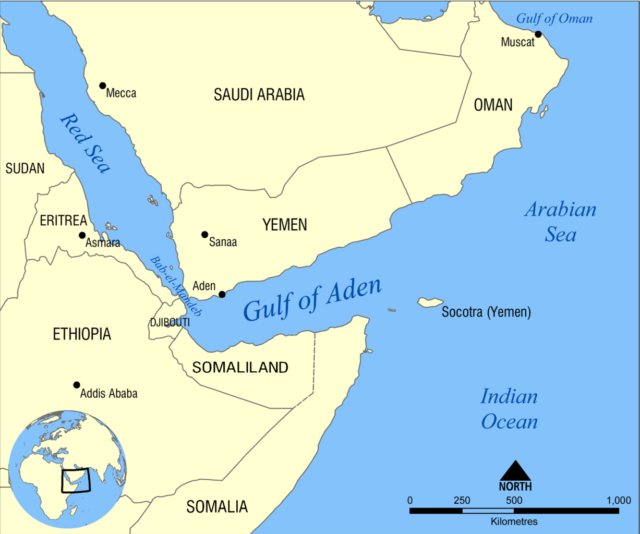
Geopolitical Report ISSN 2785-2598 Volume 38 Issue 1
OSINT Team
The Gulf of Aden and Red Sea maritime routes face heightened security concerns because of Houthi rebel attacks to support the Palestinian cause amidst Israel’s actions in the Gaza Strip. Despite the US Navy’s intervention and international commitments, major shipping companies are hesitant to resume operations, diverting routes or applying surcharges. The situation is dynamic, with varying risk assessments among companies.
Key Findings
- Despite international efforts, Houthi rebel attacks in the Gulf of Aden and Red Sea persist, prompting shipping companies to reassess the safety of the Suez Canal route.
- The US Navi’s intervention to contrast piracy and security problems in the region has not provided guarantees to major shipping companies that are hesitant to resume operations.
- The Israeli-Palestinian conflict proved its impact on regional geopolitical dynamics and trade, confirming how delicate is the situation related to the Israeli military operation in the Gaza Strip.
Gulf of Aden’s Security Situation:
Background Information
Houthi rebels’ attacks on commercial ships in the Red Sea have resulted in a significant redirection of global trade routes away from the vital maritime corridor linking Africa and the Arabian Peninsula.
Traditionally, this route serves as a critical conduit for the transportation of essential commodities, including oil, natural gas, grains, and an array of consumer goods ranging from toys to electronics.
Because of this strategic shift, there is an expected disruption in the timely flow of goods through the Suez Canal, a major global trade artery through which 12% of the world’s trade typically transits.
All major shipping companies apply surcharges on Middle East-related shipments. Last updates indicate Danish Maersk intends to resume operations, while MSC diverts all ships from the Suez Canal, opting for the longer route via the Cape of Good Hope.
German Hapag-Lloyd deems the region “too dangerous,” choosing the Cape of Good Hope route but reviewing the situation. French CMA CGM plans a gradual return to Suez Canal transit, and BP avoids the area for crude cargoes.
Analysis
The reluctance of major shipping companies to resume operations in the Gulf of Aden and Red Sea underscores the escalating security risks in the region. The Houthi rebel group’s involvement in maritime assaults adds a layer of complexity to the already fragile geopolitical landscape.
Shipping companies face a delicate balance between ensuring the safety of their assets and maintaining crucial trade routes. The varied reactions, including avoiding the situation entirely or implementing phased approaches, demonstrate the complex process of decision-making in the face of changing risks.
The Suez Canal’s strategic significance as a major trade route heightens the economic effects of sustained disruptions. The considerations of risk mitigation, cost implications, and the dynamic security environment contribute to the complexity of decision-making for shipping companies navigating through these troubled waters.
Risk Assessment
The risk assessment for the region shows a high level of uncertainty, with divergent perspectives among shipping companies. Persistent Houthi rebel attacks, coupled with the potential for increased regional tensions, pose significant threats to maritime operations. The economic risk increases for shipping companies and the trade ecosystem due to route diversions and surcharges.
Scenarios Analysis
- Status Quo Continuation. Shipping companies maintain the current cautious approach, with diversions and surcharges persisting as they monitor the security situation.
- Regional De-escalation. International diplomatic efforts reduce regional tensions, prompting shipping companies to reassess the situation and consider a gradual return to the Suez Canal.
- Escalation and Further Disruptions. Continued Houthi attacks or broader regional conflicts lead to an escalation of security concerns, forcing shipping companies to reevaluate their presence in the region, potentially opting for alternative routes beyond the Cape of Good Hope.
Conclusion/Suggestions
Given the fluid nature of the situation, it is recommended that shipping companies maintain a vigilant stance, regularly reassessing the security dynamics and geopolitical developments in the Gulf of Aden and Red Sea.
Collaborative efforts with relevant authorities and international partners are crucial for obtaining accurate threat intelligence and mitigating risks associated with maritime operations in the region.
Companies should also factor in potential economic repercussions and establish flexible strategies to adapt to developing scenarios while prioritising the safety of their assets and personnel.
For those with an interest in acquiring comprehensive insights into the dynamics of the Gulf of Aden and Red Sea, we encourage you to reach out to our team by emailing info@specialeurasia.com. We are poised to facilitate an assessment of the opportunity for you to obtain a meticulously crafted and specialised report tailored to your intelligence needs.



